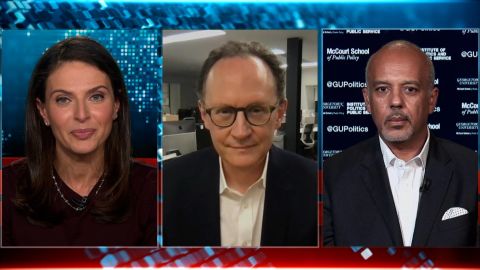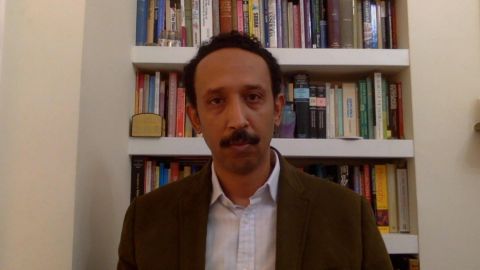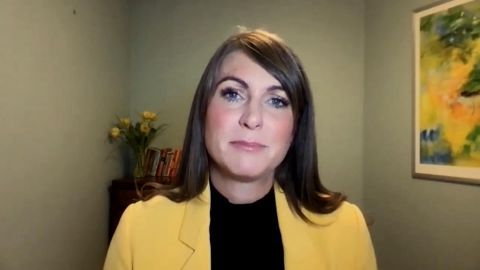Read Transcript EXPAND
BIANNA GOLODRYGA: Well, from a crisis of democracy to a crisis in the workplace. And as the pandemic eases in some parts of the world, we’re seeing a so- called great resignation. Since April, 20 million people in the U.S. have quit their jobs according to federal statistics. Our next guest, Jennifer Moss explains this phenomenon in her new book, “The Burnout Epidemic.” Here she is talking to Michel Martin about the causes and why this is a cultural, not an individual problem.
(BEGIN VIDEO CLIP)
MICHEL MARTIN, CONTRIBUTOR: Thanks, Bianna. Jennifer Moss, thank you so much for joining us.
JENNIFER MOSS, AUTHOR, “THE BURNOUT EPIDEMIC”: Thanks so much for having me.
MARTIN: So, why don’t we talk about what burnout is, because I think this is a term that a lot of people have started to use. You’re saying it’s not just like needing a break. What is burnout?
MOSS: In 2019, the World Health Organization did identify burnout as a workplace phenomenon. It’s stress unmanaged at work. And that was a milestone. Because for a long time, you know, we’ve been trying to think of it in a totally different context outside of work. But they really nailed that down and I think that’s been very effective for us to actually deal with it. But it also shows up in these big three signs. So, exhaustion. How exhausted are we at the end of the day? You know, do we feel like we’re completely depleted? Do we feel like we have no interests anymore, that we’re not spending time with family? We’re not doing anything in our life that contributes to our happiness? You know, that level of exhaustion in the morning, we’re completely so tired and demotivated that it’s like, walking through cement to try to get in the shower and get started. Those – – that’s exhaustion. Then there’s disengagement. So, essentially, emotional distance from your work. Do you feel like you’re chronically overworked, so you no longer feel connected to the job anymore? You start to wonder, am I even good at this? Do I — is there any kind of value that I’m contributing? And that kind of uncertainty, that frequency of feeling like that creates burnout. And then, finally, the third sign is cynicism. And that is sort of a biggest warning sign, when we have cynicism, because you — imagine, we’re in a pandemic, we’re exhausted. We might feel disengaged from work, that makes sense. But when we start to feel hopeless, like we have no agency, we can’t control any of the controllables, we starting to say things like, I’m going to feel like this forever, this is how it’s all going to be that, that kind of fatalist sort of language, that’s when we’re really at risk of hitting the wall.
MARTIN: And I take it that you think it’s really important to associate to burnout with the workplace, because I know we use term in other contexts. Like, wow, I’m really burned-out on video games or I’m really burned-out on yard work or something like that, but I think you think it’s really important to sort of identify this as a workplace-related syndrome. Something that’s really focused on your work. Why do you think that’s important?
MOSS: It’s important because the only way that we’re going to solve for burnout is if we have an ecosystem approach to it. If we have policies at the government level. If we have structural changes. I mean, we cannot solve for burnout, you know, when it’s systemic discrimination and lack of psychological safety at work when we’re feeling like that in our personal lives, as well. So, I’m really trying to narrow the fact that down burnout is a consequence of unmanageable workloads makes it so that there’s accountability on all side fix it. You know, when we just say, this is burnout, it can happen in your personal life, then it becomes your fault if you’re burned-out. And we don’t want that. We need to move away from just use self-care as the cure. Instead, it needs to be that there’s a lot of other people and work being done to actually fix the problem.
MARTIN: And why does this matter? You literally have a sense of urgency around this as an economic problem as — not just an individual workplace problem, but as a societal problem that you think has significant economic ramifications. So, why do you think that is?
MOSS: There’s so many implications of burnout. And I don’t think a lot of us realize what those trickle-down impacts are. You know, the fact that lack of fairness has disproportionately impacted women and those in vulnerable groups inside of pandemic, that’s a huge problem. We’re seeing mass exodus of women from the labor force, and that’s due to, you know, lack of proper care-giving policies and family planning policies and inequity inside of — even just paternity and maternity leaves, really forcing it on women to manage all of the unpaid labor at home. Women’s unpaid labor went from four hours, which I think was underreported per week to 20 hours. I mean, and a lot of that has to do with the fact that we aren’t doing a good job with these policies. When you think about the impact on the GDP in 10 years from now, they’re saying this long-term unemployment of women and women leaving the workforce could equal about $1 trillion in deficit. I mean, that’s macroeconomics. When you look at communities like nurses, for example that are so burned- out, they can’t go to work, because they’re completely exhausted. And you then have hospitals shutting down. So, then, people can’t actually get care. I mean, there’s all of these tiny little pieces of the puzzle that trickle down into our, you know, communities and into how we’re going to be treated from a health care standpoint. And when you actually even look at just the most catastrophic impacts, overwork kills 2.8 million people globally a year. I mean, that is pretty serious. So, when you think about burnout in this way that’s diminished, it really makes those stats seem like they’re unimportant, as well. We can’t diminish the fact that it does have these serious results if we don’t solve for it.
MARTIN: Some of the reasons we called you right now is what a lot of people are calling it The Great Resignation, The Great Quit. I mean, millions of people are leaving their jobs. I mean, we’re talking about just in the United States right now. According to the U.S Bureau of Labor Statistics, in August, more than 4.2 million people handed in their two weeks’ notice. People are quitting their jobs. And do you think burnout is a significant factor here?
MOSS: I do. And the data is representing that. When you look at the Microsoft survey, for example, that looked at 30,000 employees globally, only 4 percent said it was compensation, as their reason for leaving. Most people were saying that unsustainable workloads, which is a strong predictor of burnout. They are talking about not feeling supported in their mental health at work. We’re seeing a lot of people describing this sense of loneliness and isolation, working apart from teens. Our younger workforce is extremely burned-out, what you’re seeing a lot of shift in that group, and it’s before they feel like they started this job in the pandemic, they haven’t met their boss, they haven’t met their coworkers. They feel like they have not enough time with those folks that are going to help them advance their careers. I mean, all of these things are just contributing. And, of course, like we said, the fact that there’s certain groups and certain sectors that were really hard hit, a lot of those in marginalizable groups are now long-term unemployed. So, you know, these are the things that people are deciding after 20 months of facing your own mortality, you have to imagine that we’ve changed. We have different expectations of work. We have different expectations of our own lives. And if work is going to make us feel unwell on top of this other macro stress that we’re dealing with, we’re going to say, I’m done, I’m going to figure out a new way to live my life, because this isn’t working for me anymore.
MARTIN: How widespread is this phenomenon? I know that you’ve done new research on this, specifically focusing on the COVID experience, like what impact COVID has had on this. Can you share some of those findings?
MOSS: Yes. And I had the privilege of working with foremost experts in burnout, Dr. Christina Maslach, Dr. Michael Leiter and Dr. David (INAUDIBLE), we gathered data from 46 different countries, thousands of responses, not just quantitative data, but qualitative data like what people were feeling. And 85 percent of people said their well-being had declined in the pandemic. We saw workloads significantly increasing, and that was playing into their burnout. People that had to identify that they couldn’t talk about mental health at work, 67 percent of them said that they were extremely or often burned-out. So, all of these pieces of the puzzle, you start to realize that there’s a need to be able to have these conversations when you are in this sort of collective traumatic event. And you instead are finding that employers have — you know, have made this as sort of a business as usual. Where still, you know, growth at all cost. Innovate or die. You know, kind of that same mentality, because that’s what the legacy has been for so many years. We didn’t pause and realize that we need to think about differently about it in the moment. And so, what’s happened is, we’ve had to work, you know, 30 percent more each day to hit those same goals. And we saw that in the data, just this level of tiredness and feeling disconnected and disengaged, across the globe.
MARTIN: Tell me a few more things from your study that really stood out to you.
MOSS: We found that — and this is pre-pandemic as well, that women are more likely to burnout than men. But in the pandemic, it was even more significant. One stat was really surprising to me that 89 percent mentioned that their work life had worsened, never — you know, according to Maslach and Leiter that they’ve never seen that kind of level of burnout inside of their data, and they’ve been measuring it for many years. We found that only 2 percent of respondents rated their well-being as excellent. So, you can imagine that there’s just a strong feeling of lack of well- being. We also found, too, that there was a significant amount of people feeling disconnected from both coworkers’, family and friends. We heard a lot of, you know, our respondents in their own words just share this feeling of, I love having the agency, but I hate the fact that I’m so lonely. I’m so disconnected. And that our most burned-out group were gen-Zs and millennials. They were describing the loneliest they’ve ever felt, and 74 percent of them said it was across the board that it was the loneliest they’ve felt, which was different than 52 percent pre-pandemic. So, there’s a lot of data, obviously, that is showing up, and that it’s worsened. And I think that, you know, the research is really demonstrating that the pandemic exacerbated all of those existing issues and that people are really struggling right now.
MARTIN: Forgive me, I have to play devil’s advocate and just ask, I think some people listening to our conversation might say that this generation has just gone soft. You know, you can see where some people who listen to this conversation say, A, this is an elite conversation. You know, we only care about certain people who are highly educated and hard to replace. And B, you know, maybe people should just toughen up. So, what would you say to that?
MOSS: You know, I validate that sentiment, because I do think that we’ve swung the pendulum really far to one direction and that there are people that, you know, when you look at the demographics of those who are burned- out than others, there is a difference in age. The older you get the less likely you’re going to self-burnout because there’s different expectations around that. But there are also are — is more agency for those in those professions as they start to get, you know, more senior, they have more choice. And I love, as a well-being expert, you know, the fact that we are driving more conversations, you know, around mental health at work, that we are pushing the limits around flexibility and giving people more agency. I mean, that’s really important. But I still think we need to have a level of compromise. You know, it’s not purely transactional anymore between employer, employee. I get that. But we do need to get to a point where employers can say, you know, I would actually like you in the office two days a week and then, you work remote three days a week or whatever that looks like. And there’s a compromise with that. But employers have just been acting really badly for a very long time. And I think this is almost like, you know, a cancel culture moment or an accountability moment, whatever’s happening right now, that is sort of highlighting that this has been an underserved problem for a long time that we haven’t treated. So, I’m hoping that somewhere in the middle becomes this — just this healthier way of behaving across the board. And the bad actors that get called out and those that are doing a good job get called out, too.
MARTIN: So, what do you say employers are doing wrong here? Because, you know, we hear that at least employers who can, you know, afford it, are trying to do nice things. On the other hand, like other people are taking pay cuts and having to take furlough days and things of that sort. So, what is that it employers are doing wrong in your view?
MOSS: Well, you know, unfortunately, I have to say, you know, and I’m sort of in the role of the provocateur and calling out companies for are not doing a great job on this so far. A big problem that is we are not bifurcating burnout prevention strategies with wellness tactics. You know, it’s really great to have these socials and, you know, these — whatever, these happy hours at 4:00 in the afternoon with the family and your pet show. And people see that as workload. Well-being is workload. And it shouldn’t be that way, because that’s just employers putting sort of band- aid downstream tactics on things that are really not the problem. The problem is way further upstream. And instead of, you know, pulling people out as they’re drowning all the way down the river, we need to stop them from falling in. I keep hearing these declarations of, well, we gave our, you know, burned-out employees a week off to recover. Well, that’s not going to do anything if you’re sending them right back into the same unsustainable workloads of 80 hours a week. So, you need to be doing better at sort of managing boundaries and making sure there’s policies around — you know, right to disconnect policies are really helpful. All of those types of things happen upstream, so that when you give people time off, it’s not recovering from something, it’s actually — you know, it’s optimizing them already being well.
MARTIN: So, how do we think about this? I mean, is there something that people could be doing right now to address this? There are so many moving parts to this. I mean, if you’re talking about health care, you’re talking about how people are trained, how people are compensated. What — the funding streams for these institutions are — that dictate how they pay people. But are there things that people could be thinking about right now to address what you’re calling an epidemic?
MOSS: I think it’s understanding that there is a lot of work to be done and the more that we can actually talk about it and bring it to light, people can be working on it in different places. I mean, the right to disconnect, for example, I’m based in Ontario and Canada. They’re looking at bringing that into this province and that changes then maybe how, you know, the rest of the Canadians are going to be able to remove themselves from work at midnight when their boss pings them. So, these are the kind of things that have to happen at all different levels. But we need to look at it in a hopeful way, too. That it’s solvable by controlling the controllables. So, no, we can’t solve for this macro stressor, the pandemic. And nobody can really do that. There’s some work, but it’s going to be a while. This is likely going to be endemic. So, how do we work within the constraints? And a lot of it has to do is really leading with empathy and compassion. And I talk a lot about human-centered leadership, this idea that when we’re inside of organizations and we are a manager, how do we get to the root of the problem? And that is more frequency of communication, more consistent communication, so it builds trust, providing a space where people can talk about their own mental health at work. Being able to destigmatize burnout, making it not shameful or there’s self-blame when it comes to burnout. Making sure that we have boundaries and policies around workload. More discussions to make sure we’re even, you know, efficient in how we work. There’s so many inefficiencies that happen in workload that’s basically just on a manager not talking to their employee about what they’re working on. I mean, these are solvable things. Changing our paternity and maternity leave so they’re equitable. You know, making sure that diversity just — we don’t just see a whole lot of people that look different on the bottom layer, but then there’s no one in, you know, the top structure that looks, you know, any different than one another. I mean, we need to make sure that there’s representation. These are solvable problems.
MARTIN: Jennifer Moss, thanks so much for talking with us.
MOSS: Thanks so much for having me. It was a great conversation.
About This Episode EXPAND
Mo Elleithee and Mark Landler analyze President’s Biden’s current domestic agenda and how could it impact American diplomacy. Cardinal Blase J. Cupich weighs in on President Biden’s meeting with Pope Francis. Journalist Mohanad Hashim discusses the Sudan coup. Jennifer Moss explains why the U.S. is experiencing a wave of professional resignations and a burnout epidemic.
LEARN MORE



